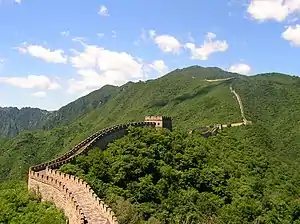Great Wall of China
English

A portion of the Great Wall of China near Beijing (July 2006)
Etymology
(This etymology is missing or incomplete. Please add to it, or discuss it at the Etymology scriptorium.)
Proper noun
- An ancient Chinese fortification, almost 4,000 miles long, originally designed to protect China from the Mongols.
- 1767, Annual register, or a view of the history and politics and literature for the year, page 38, column 2:
- Of the Mongall Tartars.
The Mongalls are a numerous people, and occupy a large extent of country, from this place to the Kallgan, which ſignifies the everlaſting Wall, or the great wall of China. From this wall they ſtretch themſelves northward as far as the river Amoor; and from the Amoor, weſtward, to the Baykail ſea ; where they border with the territories of the Kontayſha, or prince of the black Kalmucks. On the ſouth, they are bounded by a nation called Tonguts, among whom the Delay Lama has his residence.
- 1796, The Annual Register, or, a view of the History, Politicks, and Literature for the Year 1767, 5th edition, London: J. Dodsley, page 38:
- The Mongalls are a numerous people, and occupy a large extent of country, from this place to the Kallgan, which ſignines the everlaſting Wall, or the great wall of China.
- 1894, Thomas Gaskell Allen, Jr., William Lewis Sachtleben, “Over the Gobi Desert and through the Western Gate of the Great Wall”, in Across Asia on a Bicycle: The Journey of Two American Students from Constantinople to Peking, New York: The Century Co., →OCLC, pages 190-191:
- Near that same fortieth parallel of latitude on which our Asiatic journey was begun and ended, we now struck, at its extreme western limit, the Great Wall of China. The Kiayu-kuan, or "Jade Gate," by which it is here intersected, was originally so called from the fact that it led into the Khotan country, whence the Chinese traders brought back the precious mineral.
- 2018 August 2, Christina Zhao, “Great Wall of China Collapse: Poor Renovation Works And Heavy Rainfall Blamed”, in Newsweek, archived from the original on 02 August 2018:
- A northern section of the Great Wall of China collapsed after a period of heavy rain last month, with many blaming poor-quality renovations for the deterioration of the iconic landmark.
- 2020 August 7, Steven Lee Myers, Keith Bradsher, “Beijing Launches Another Demolition Drive, This Time in Its Bucolic Suburbs”, in The New York Times, →ISSN, →OCLC, archived from the original on 07 August 2020, Asia Pacific:
- Backhoes moved house by house, laying waste to a community called Xitai that was built in a plush green valley on the northern edge of Beijing, only a short walk from the Great Wall of China.
- 2022 February 6, Mari Saito, Winni Zhou, “Snowboarding-Proud Kiwi Sadowski-Synnott bags New Zealand's first Winter Games gold”, in Jacqueline Wong, Clare Fallon, editors, Reuters, archived from the original on 30 May 2022:
- Sadowski-Synnott scored 92.88 on her final run, landing back-to-back 1080s on a challenging course resembling the Great Wall of China.
Asked how she felt about making history as the island nation's first Winter Games gold medallist, she said it made her a "proud Kiwi".
- For more quotations using this term, see Citations:Great Wall of China.
Derived terms
Translations
Chinese fortification
|
See also
Further reading
- Saul B. Cohen, editor (2008), “China, Great Wall of”, in The Columbia Gazetteer of the World, 2nd edition, volume 1, New York: Columbia University Press, →ISBN, →LCCN, →OCLC, page 779, columns 1, 2
- “Great Wall of China”, in Collins English Dictionary.
- “Great Wall of China, pn.”, in Lexico, Dictionary.com; Oxford University Press, 2019–2022.
- “Great Wall of China”, in OneLook Dictionary Search.
- “Great Wall of China”, in Merriam-Webster Online Dictionary, Springfield, Mass.: Merriam-Webster, 1996–present.
- “Great Wall of China” in TheFreeDictionary.com, Huntingdon Valley, Pa.: Farlex, Inc., 2003–2024.
This article is issued from Wiktionary. The text is licensed under Creative Commons - Attribution - Sharealike. Additional terms may apply for the media files.